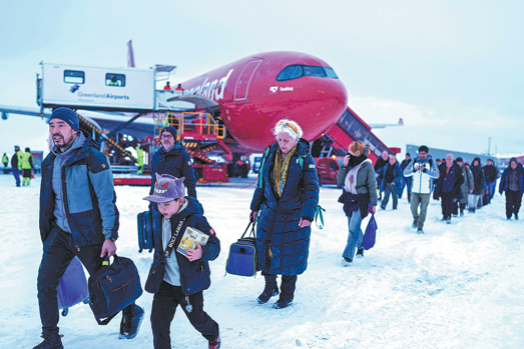USCBC: 'appropriate' to ease tariffs in outbreak
By ZHAO HUANXIN in Washington | chinadaily.com.cn | Updated: 2020-02-06 11:21

Containing the coronavirus outbreak is "in the common interest of both the United States and China", and it is an "appropriate gesture" to reduce or eliminate tariffs in the wake of the virus, according to Craig Allen, president of the US-China Business Council (USCBC).
"Probably the best way to keep the epidemic out of the United States is to support efforts in China to contain it in China," Allen told China Daily, as the virus has killed 563 people in China, with 2,987 new cases reported in Central China's Hubei province on Wednesday.
Twelve cases also have been confirmed in the US, the latest reported in Wisconsin on Wednesday.
Some members of the USCBC, which represents about 200 American companies that do business with China, have donated anti-viral medicines and equipment and other materials to various institutions in China, according to Allen.
"Our companies recognize that assisting and supporting the Chinese government with regard to combating this virus is in our common interest," Allen said. "And we want the Chinese government to be successful in stamping out this enemy."
The USCBC did not provide details about the members' aid to China's anti-epidemic efforts.
Minnesota-based Cargill, which employs 10,000 people in 50 locations in China, has pledged nearly $300,000 to relief efforts through the Chinese Red Cross, while 3M, another USCBC member based in the state, donated medical supplies such as respirators, surgical masks and hand sanitizer in affected areas in China, the St. Paul Pioneer Press reported on Tuesday.
No US employees in the USCBC member companies in China have contracted the virus, but there are a few confirmed cases among their Chinese colleagues, Allen said, adding that there was no panic among the US companies, and he wished the patients "speedy recovery".
Allen, who was the senior commercial officer at the US embassy in Beijing during the 2003 SARS (severe acute respiratory syndrome) episode, said he believed the Chinese government has learned the lessons of that outbreak, and has reacted vigorously to the current event.
He said it is correct for China to take "draconian, strict, large-scale, no-compromise" measures to contain a new virus "of which we know very little". The unprecedented moves include postponing the spring semesters of schools and putting Wuhan, the epicenter of the epidemic with more than 10 million populations, on lockdown.
"I am hopeful that as the very strict measures led to the elimination of SARS, that the strict measures that the Chinese government is making now will be enough to resolve the problem," he said.
On Jan 30, US Commerce Secretary Wilbur Ross expressed sympathy for the victims of the coronavirus, but described the outbreak as presenting a possible economic opportunity in that it would probably facilitate the return of jobs.
Allen said it is unlikely that a lot of jobs are going to return as a result of the virus. Most of the work that is being done in Hubei is labor intensive, so even if they consider moving, they likely would not come to the US.
"We should have nothing but encouragement to our Chinese friends as they fight a deadly disease, which does not respect borders," Allen said. "Now is not the time to think about competitive advantage. Now it's the time to defeat a common enemy."
The viral outbreak highlights the fact that many of the major problems that the United States and China face are global problems, such as pandemic, terrorism, money laundering, hacking, and climate change, which require the two to work together.
"These are areas that the United States and China should work together. If the United States and China don't work together on these real subjects that affect real American citizens and real Chinese citizens, then those problems cannot be resolved," he said.
Asked to comment on US media reports that the spread of the virus is likely to slow China's progress in implementing the phase one trade deal reached last month, Allen noted it was a 24-month agreement.
"We do have time to implement the agreement, but the starting phase here has not been helped by the virus," he said.
"I know that our Chinese government colleagues have reiterated their commitments there. But the focus at the current time certainly is on containing the virus, and that's appropriate," he said.
Allen reiterated that the USCBC has been consistent in opposing tariffs. The phase one deal leaves tariffs in place on more than $360 billion of Chinese goods.
"I think indeed that it would be an appropriate gesture to reduce or eliminate tariffs in the wake of the virus," he said.
























